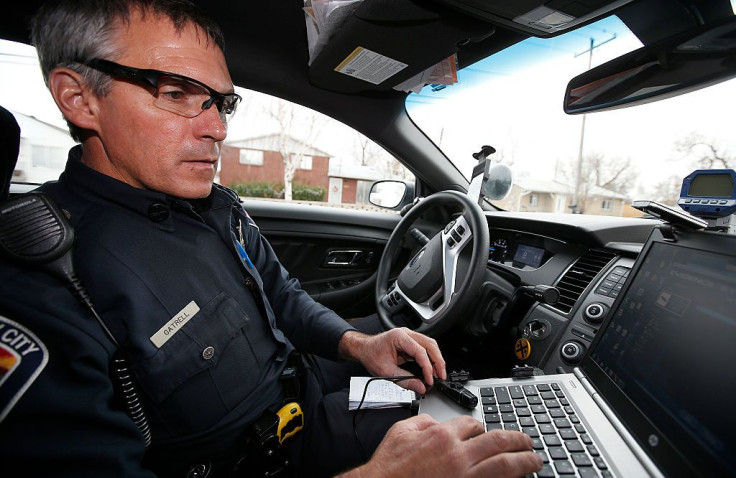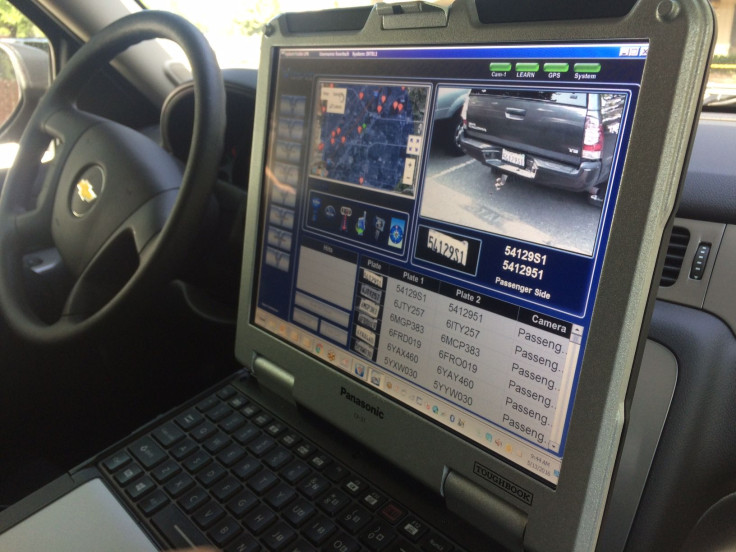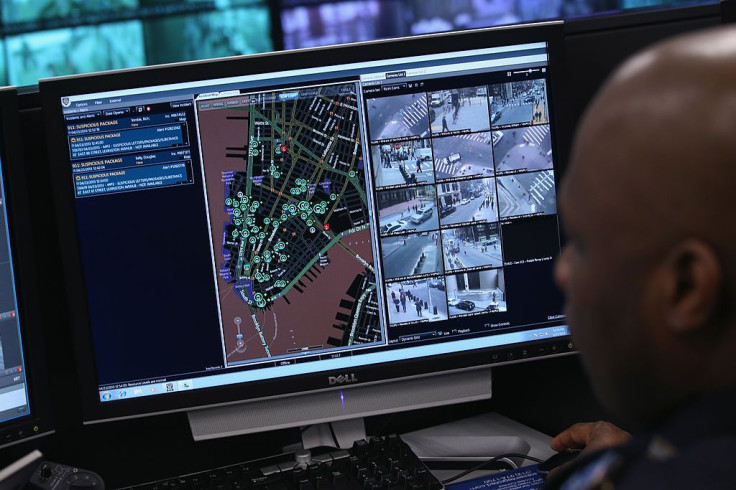Police Are Tracking Your Car With This Technology Even If You’ve Done Nothing Wrong

In 2013, Disney on Ice came to the 17,000-seat Sleep Train Arena in Sacramento, California, for an afternoon of kid-friendly entertainment. As hundreds of families streamed into the event, Sgt. Kyle Hoertsch was stationed outside in his cruiser, silently searching for sexual predators. Hoertsch, a 20-year veteran in the Sacramento County Sheriff’s Office who serves as a commander in the department's Sexual Assault Felony Enforcement task force, wasn’t searching based on simple intuition.
Rather, he had some high-tech help.
Mounted on the roof of his cruiser was an automatic license plate reader, a device that scanned hundreds of vehicles' license plates as they entered the parking lot. As each car rolled in, the scanner sent a "ding" to his dashboard computer. Because sex offenders are legally required to register their vehicles with the police, Hoertsch was able to monitor the event to see if any sex offenders showed up who weren’t supposed to be there.
“Operation Where’s Ickey?" as Hoertsch called the exercise, was a success: He says he was able to arrest two men for violating the terms of their parole. “Those arrests were made using the [license plate reader] technology,” the officer recalled in a recent interview. “One-hundred percent.”
That "Where's Ickey" exercise was a few years ago, and the adoption of scanning technology has spread rapidly since then. License plate readers are one of the hottest pieces of high-tech equipment currently on the law enforcement market. While there are no official national statistics on the number of police agencies that use the cameras, one recent survey by the Police Executive Research Forum found that 71 percent of police forces in America use the technology.

The report stated that 85 percent of police agencies plan "to acquire or increase their use of [license plate readers] during the next five years."
Why Police Love Plate Scanners
For years, police officers have manually recorded people's license plates into their computers to aid in investigations. But one reason the plate readers are so popular among law enforcement is that they can scan plates at scale: up to 180 scans per minute. The way it works is fairly simple: The scanners, which are roughly the size of a small laptop and mounted to the hood or roof of the car, use high-powered infrared cameras to snap photos in daylight or at night. Along with the numbers and letters on the plate, the cameras also record the time and location of the scan.
Once a plate number is scanned, the system automatically runs it through a variety of police databases and known “hot lists.” Whenever an officer gets a “hit,” the system triggers an audible alarm in the squad car. Of course, this sort of technology isn’t free. According to a 2015 purchase agreement with Vigilant Solutions, a Livermore, California-based company that is the largest seller of the technology, Sacramento County spent $553,520 to purchase the system. Each cruiser is outfitted with $5,000 to $20,000 worth of equipment, depending on the model, in addition to the yearly costs of access to Vigilant's software systems.
Officers like Hoertsch say the technology is a game changer, because it allows officers to drive down the road and instantly know if there’s a potential criminal they should be focusing their attention on. “It’s all for the best,” he says. “I live in this county, and I would like to see more of it, honestly.”
But the use of the technology is decidedly less popular among privacy advocates, who say it results in mass data collection on people who have committed no crimes at all. In fact, Vigilant Solutions says it holds a database of 2.8 billion plate scans, growing at a rate of 70 million a month. “In aggregate,” the Electronic Frontier Foundation noted recently, “the information can reveal personal information, such as where you go to church, what doctors you visit and where you sleep at night.”
You Can Run, But You Can't Hide
If you live and drive in America today, there’s a good chance your local police officer could instantly pull up where you’ve been driving and where you’ve been going. “License plate readers raise really significant privacy concerns,” says Tessa D’Arcangelew, a staff member at the Northern California American Civil Liberties Union who focuses on police surveillance technology. “They record information about a person’s location over time and that can create a record, really, of that person's habits and associations. It can say a lot about who you are.”
In a recent ride-along interview with Hoertsch, he rolled slowly through Sacramento city streets to show off how the system worked. The computer dinged every few seconds, recording each license plate. A loud alarm bell sounded each time a license plate belonging to someone on parole was scanned, which happened several times throughout the two-hour ride. According to the sergeant, the system scans about 500,000 license plates monthly. He understands why people might be concerned that the police have the ability to track their movements, but he says it’s a misguided fear.

“The downside, which everyone tries to go after, is Big Brother, tracking people everywhere,” Hoertsch says. “These cameras are set up to scan the rear license plate. ... We don’t want to get pictures of people’s faces. That’s the line to me. We’re tracking the cars. When I mean tracking, it’s ... a picture of the vehicle, it’s time, it’s who scanned it, the day, and that’s it. We store our stuff for two years.”
In reality, however, license plate scanners remain a largely unregulated technology. Right now, only law enforcement officers are typically allowed access to the databases. In 2013, the EFF and ACLU sued the Los Angeles police to see the data, but the LAPD refused, arguing that “All [license plate] data is investigatory.”
License plate reader bills were either introduced or are currently pending in at least 18 states this year, according to the National Conference of State Legislators. And in October 2015, California enacted legislation that specifically guided how the police can use data. Specifically, California will allow police to hold the data for no more than 60 days, "unless the data is being used as evidence or for the investigation of felonies." The law also prohibits "selling the data or ... making the data available to an agency that is not a law enforcement agency or an individual that is not a law enforcement officer." Right now, there are no bills pending in Congress for federal action on the issue.
At issue, really, is how long police have access to the data — and who has access to it. While many law enforcement officers like Hoertsch believe the data should be kept on file for good, others believe it should be retained just for a finite amount of time. In New Hampshire, for instance, where the state motto is “Live Free or Die,” license plate scanners are banned altogether, largely because legislators did not believe law enforcement would go for the short retention times.
"The police chiefs made it clear they would, within three years, push to extend ... and that effectively would turn a useful law enforcement tool into a mechanism for state surveillance of innocent civilians without a warrant," Rep. Neal Kurk, who helped ban the license plate reader technology in the state, told Government Technology.
'We Don't Spy On You'
Sgt. Kyle Hoertsch, however, says the police are uninterested in the activities of everyday citizens, and concerns over surveillance are overblown. While driving slowly through a parking lot of a low-rise apartment building and scanning each car’s license plate, he said the technology has helped his department solve hundreds of crimes, though he doesn’t keep an official tally. When each car is scanned, it sends an alert to his dashboard computer. If the car has stolen plates or is registered to a person on parole, a siren sounds in his car. If the person is not present but he wants to investigate further, Hoertsch says he can come back later with backup.
There are high-profile instances of the plate readers successes, too. In Virginia, for instance, state troopers were able to track down a man who murdered two journalists on air within the matter of minutes.
By plugging in the suspect’s license plate number, a state patrol officer received a “hit” almost immediately. “As soon as it was entered, it came up with a positive hit that the vehicle just passed me less than three minutes earlier,” Virginia State Trooper Pamela Neff told local news outlet WIVB. “I let my dispatch know that the vehicle had passed me and I attempted to catch up with the vehicle, which was traveling eastbound on 66.”
There are other recent successes, as well. In Ohio, license plate readers were used to help solve a triple-murder case. Often, the system is used by prosecutors to help build a case against a suspect. "It helps paint a picture," Hoertsch says.
While police tout the success in finding criminals using the scans, it’s also important to note that the scanning technology is far from perfect. In fact, sometimes — whether because of poor lighting or a dent in the license plate — the camera will return with the wrong number. In other words, sometimes the scans just get it wrong, which can lead to dire consequences.
The Technology Isn't Perfect
Consider the case of Denise Green, a 50-year-old San Francisco city employee who was driving home one evening when she was stopped by a police officer, who pulled her out of her car with his gun drawn, ordered her face down on the pavement, and handcuffed her while he searched her car. Apparently, the scanner mistook one digit in her license plate, and because of the error, it appeared that Green was driving a stolen vehicle.
“She was a completely innocent person, a longtime employee of the city of San Francisco, and one night police mistakenly picked up her license plate and said it was stolen because it misread a 3 for a 7,” her lawyer, Michael Haddad, said in an interview. “The officer radioed out to other officers. They didn’t clarify, visually, if Denise Green’s actual license plate was the same as the computer system was telling it. Without any verification, they decided to do a high-risk traffic stop. It included pulling her out of her car at gunpoint, forcing her onto her knees, handcuffing her.”
He added, “Police know these things aren’t foolproof. They’re not 100 percent accurate. But sometimes police will rely on technology and treat it as if it is perfect, and the consequences are that they’ll use force against people when it’s not justified.”
Haddad and Green sued the city of San Francisco, and in 2015 won a settlement for close to $500,000. Hoertsch says he knows about the Green case, and now uses it as an example of what not to do when training officers on the license plate reader system. “That was p----poor training,” he says. “Whenever anybody gets a log-on, I say this is the way it works, we don’t want to be pulling grandma over at gunpoint.”
If you live and drive in America, there’s a good chance your local police officer could instantly pull up where you’ve been driving and where you’ve been going.
The government regulation around license plate readers doesn't bother just Hoertsch — it's bad for businesses, too. Shortly after the ACLU campaigned for stricter rules, Vigilant Solutions issued a statement saying that laws that restricted license plate reader use could result in criminals going free. "The resulting rash of anti-LPR (license plate reader) legislation from to Connecticut to Indiana to California threatens to create a crazy quilt of mismatched legislation, limiting how the law enforcement community uses LPR to solve crimes in thousands of jurisdictions nationally," Vigilant wrote on its website.
The device maker added, "They say beauty is in the eye of the beholder. When it comes to LPR bills, the vast majority are unattractive and risk citizen safety without improving personal privacy protections one iota. They are the ugly, the uglier and the ugliest."
Tessa D’Arcangelew, the ACLU staff member, disagrees. She says that while license plate readers might be a lucrative endeavor for the companies that make them — and give officers an ability to track potential suspects with ease — the real question is whether they actually will result in safer, better communities.
“If we’re spending all this money on surveillance, is it really all that effective in solving problems that the community has identified?" she asked. "Or, are there better ways that the money could have been spent?"
© Copyright IBTimes 2025. All rights reserved.





















